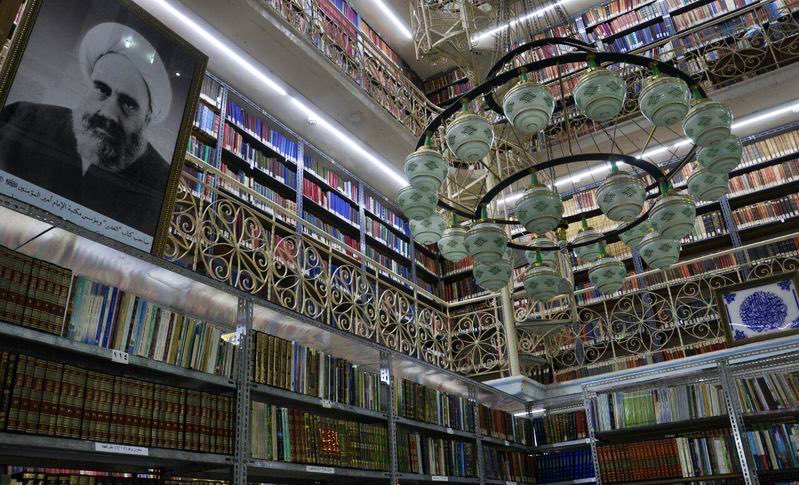
On the anniversary of the passing of the late Ayatollah Mīrzā Mahdī Gharawī Iṣfahānī, this is a short primer on one of the most influential scholars of modern times and his school, which went on to influence many of today’s leading scholars and Shi’a movements.
[Thread]
[Thread]

Mīrza Mahdi is credited with the founding of the Ma’arifi (aka Tafkiki) school; a reformist movement designed to revive the Shi’i seminary and purify it from foreign elements that had crept into it, especially remnants of Greek theosophy & Sufi mysticism (see Hakimi, Reza) 



The movement wasn’t novel or innovative. It simply helped restore the Shi’i seminaries to their scriptural roots, and refine its Islamic intellectual/epistemological frameworks. Mīrza’s influence on Shi’a thought is substantial, as several of today’s top Marjas were his students
At age 35, Esfehani attained Ijtihad credentials from the most senior scholars of our age, incl Mīrza Na’ini, Agha Zia Araghi, Sayed Abul Hasan Esfahani, & Sheikh Abdul Karim Ha’eri, an exceedingly rare combination of accolades from such leading scholars—hawzahnews.com/news/394533/ 

In addition to his peerless accolades in jurisprudence, Mīrza became an expert in philosophy & mysticism, studying under the likes of Ahmad Karbalaei (his personal mentor) and, after years of training, certified him to practice and teach these disciplines at the highest levels
But in a drastic turn of events, after decades of mastering the intricacies of the highest levels of ijtihād, and Irfan & philosophy, while in a state of thirst for guidance at Masjid al-Sahla, in Najaf, Mīrza was blessed with the ultimate honor: an audience with Imam al-Mahdi
According to his protégés, the encounter quenched his thirst and gives him the guidance he sought. The Imam states,
طلب المعارف من غيرنا مساوق لإنكارنا..
“seeking gnosis from other than us [Ahlulbayt] is tantamount to rejecting us”, a statement corroborated by other narrations..
طلب المعارف من غيرنا مساوق لإنكارنا..
“seeking gnosis from other than us [Ahlulbayt] is tantamount to rejecting us”, a statement corroborated by other narrations..
These include authentic narrations like:
"يا كميل لا تأخذ إلا عنا تكن منا”
"حسبكم أن تقولوا إذا قلنا، وتصمتوا إذا صمتنا"
"إنكم قد رأيتم أن الله عزوجل لم يجعل لأحد من الناس في خلافنا خيرا"
All of which emphasize use of their teachings to the exclusion of others.
"يا كميل لا تأخذ إلا عنا تكن منا”
"حسبكم أن تقولوا إذا قلنا، وتصمتوا إذا صمتنا"
"إنكم قد رأيتم أن الله عزوجل لم يجعل لأحد من الناس في خلافنا خيرا"
All of which emphasize use of their teachings to the exclusion of others.
Following this transformative encounter with the Imam, and seeking to carry out his commands, Mīrza Mahdi sets out to reform the seminaries from the scourge of alien influences, and restore the teachings of the Ahlulbayt - two things that he saw as wholly irreconcilable
His classes attracted the brightest students who later became leaders of the Shi’a seminary, incl. Sheikh Waheed Khorasani (most senior scholar in Qom) as well as Sayed Ali Sistani (who needs no introduction). Both seminaries of Qom & Najaf, thus owe Mīrza an immeasurable debt. 







His many notable students (estimated to be over 70) include:
Mirza Jawad Agha Tehrani
Sheikh Mojtaba Ghazvini
Mirza Hashem Ghazvini
Sh. Ali Namazi
Sh. Hasanali Morvarid
Sayed Kazem Modarresi
Sayed Sadruddin Sadr
Sh. Maleki Mianji
Sh. M. Hussein Boroujerdi
Sh. Mahmoud Tavallaei



Mirza Jawad Agha Tehrani
Sheikh Mojtaba Ghazvini
Mirza Hashem Ghazvini
Sh. Ali Namazi
Sh. Hasanali Morvarid
Sayed Kazem Modarresi
Sayed Sadruddin Sadr
Sh. Maleki Mianji
Sh. M. Hussein Boroujerdi
Sh. Mahmoud Tavallaei




Mirza’s students then went on to teach prominent future leaders like Sayed Mohammad Taqi Modarresi (who studied under his father, Sayed Kazem Modarresi, another direct student of Mīrza Mahdi Esfehani)
In addition to invaluable class transcripts, Mirza Esfehani left dozens of written works, including:
معارف القرآن - His magnum opus on Islamic theology
إعجاز القرآن
أبواب الهدى
رسالة في البداء
المعاريض والتورية
معراج القرب واللقاء (أسرار الصلاة)
خلقة العوالم
اصول آل الرسول
معارف القرآن - His magnum opus on Islamic theology
إعجاز القرآن
أبواب الهدى
رسالة في البداء
المعاريض والتورية
معراج القرب واللقاء (أسرار الصلاة)
خلقة العوالم
اصول آل الرسول

There is no denying the monumental impact of Mīrza on the seminaries of Mashhad and, later, Najaf & Qom. As any person of influence, he has critics, who have largely misconstrued his message or clung to vestiges of Abbasid-era imports, yet he remains a towering scholarly figure
His incredible achievements were the product of a short life, as Mīrza Mahdi passed away at age 60 on the 19th of Dhul Hijjah (1945), leaving behind an astonishingly fruitful legacy, which, by the blessings of the Imam of the Time, continues to enrich the seminaries
For a more detailed bio, refer to multiple books + articles on the subject, including this (written in Farsi) jamaran.news/fa/amp/news-10…
As well as the following works:



As well as the following works:




• • •
Missing some Tweet in this thread? You can try to
force a refresh















